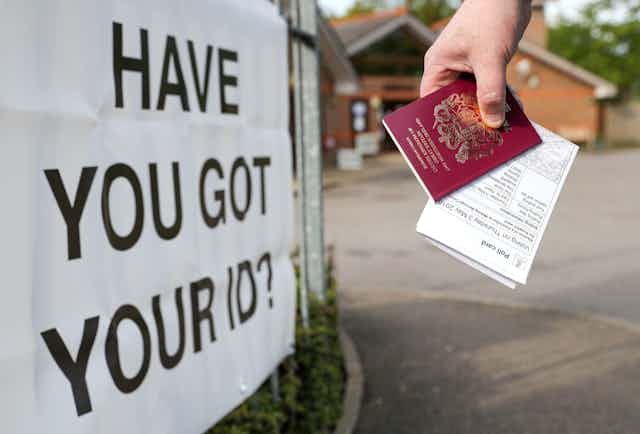The UK government has changed the law so that people in England will have to show ID when they go to vote. This controversial new rule was brought in on the insistence that the “integrity of elections” needs to be protected. But it has the potential to prevent many people from taking part in elections.
Given the stakes, you would expect this to mean there is good evidence that elections in the UK are in danger of being compromised. If there is concern about their integrity, there must be an issue with voter fraud – and specifically with people posing as other people in order to vote in their name. This, after all, would be the only problem that voter ID could resolve.
When I explored how Conservative MPs debated this controversial policy in parliament, however, I found that they didn’t seem to talk much about voter fraud by impersonation, despite voting to introduce ID to prevent it.
All the evidence shows voter fraud is extremely rare in the UK. There have been only three convictions of voter impersonation in the past seven years. I found both Conservative and Labour MPs agreed that the number of reported voter fraud cases is small.
Rather than talking about voter fraud as a meaningful problem (because they weren’t able to) Conservative MPs could be found arguing that this is “not about statistics; it is about the principle”. Even if it isn’t happening at the moment, they argued, “the risk of electoral fraud does exist and needs to be tackled” and that “electoral fraud is unacceptable on any level”.
This argument is like saying we should make rules to stop everything that might possibly happen, which is especially worrying when evidence warns the new law could deter significantly more legal votes than the fraudulent ones it might prevent.
Increasing already high confidence?
Conservative MPs also often argued that voter ID is needed to strengthen public confidence in the electoral system. In the first debate about voter ID in April 2018, Chloe Smith, who was then the cabinet office minister, argued the “policy is designed to increase confidence in our system and to make it harder for someone to commit such a crime against another person”. She said: “There is clearly the potential for electoral fraud in our system and that undermines confidence and promotes perceptions of vulnerability.”
But a recent Electoral Commission survey found that public confidence in the running of elections in the UK is currently very high among the general public. In fact, more people agree there are sufficient safeguards in place to prevent electoral fraud than those who don’t.
Most people believe barriers to democratic participation for minority ethnic groups pose more of a problem than electoral fraud. And here we do have evidence. As equality thinktank the Runnymede Trust highlights, the governemnt’s own data shows 38% of Asian people, 31% of people of mixed ethnicity and 48% of black people do not have the right form of ID to vote under this new law.
When the Electoral Commission ran pilot schemes on voter ID in 2018 and 2019, they found mixed evidence on voter ID’s effect on people’s confidence in the integrity of the election. The commission warned against its findings being used to justify a nationwide rollout.
Voters pay the price
All this makes it deeply questionable that the need to reassure the public is a sound justification for such a significant change – particularly since the repercussions could be severe.
Unlike most countries where a government ID is required to vote, Great Britain has no widely adopted free or low-cost ID option. (Northern Ireland already requires voter ID and provides them free of charge.)
Concerns have been raised that asking prospective voters to show photo ID to cast their ballot might make it harder for people from minority backgrounds and those who are less well-off to participate in elections.
The Electoral Reform Society also notes that the forms of photo ID accepted are those older people more likely have. For example, an Oyster 60+ travel card is acceptable, but not a similar Oyster 18+ card. University photo ID cards are excluded from the list.
This is interesting since Conservative MPs consistently portrayed voter ID as a benefit to all British voters and therefore positioned themselves as speaking for the electorate.
This view was not shared by representatives of major opposition parties, who grouped together to send a joint letter to the Cabinet Office. In it they described the implementation of voter ID requirements as “a blatant attempt by the Conservatives to rig the result of future elections” by preventing people from voting - especially those unlikely to vote Conservative.

It is thought that 4% of the population in Great Britain does not have the appropriate photo ID. That amounts to over 2 million people. Voters can now apply for a free voter ID but a government-commissioned survey conducted in 2022 found that less than half of those without the correct ID said they would apply to get a free voter ID card.
Various election officials and elected councillors have voiced concerns and even urged the government to delay the introduction of voter ID at May’s local elections, warning that a short timetable and lack of clarity about the rules could prevent thousands of people from voting.
My analysis highlights serious limitations of justifying electoral policy based on public opinion, without understanding how these are formed in the first place, or how they can be affected by policy changes.
Importantly, while voter ID seems to have been passed to strengthen public confidence in the electoral system, people in the UK do have confidence in the running of elections. Yet, despite this and extremely low levels of voter fraud, the controversial voter ID policy, with its potential harm to voter access, is now officially law.

